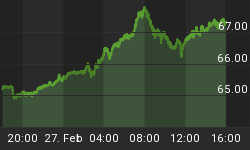Just a few weeks ago, Mario Draghi, President of the European Central Bank (ECB), announced that he would do anything required to bailout the weakest members of the Eurozone and in so doing prevent the euro currency from dissolution. Investors who may have been previously positioning themselves to withstand a euro crisis seem to be anxious to believe that such bold actions will prevent the worst. Consequently, many unwound positions in U.S. dollars and bought back euros. In the wake of the announcement, the euro rose from $1.22 to $1.30.
Two weeks ago, as signs of recession increased, Fed Chairman Bernanke announced he would do anything required to stimulate the U.S. economy, real estate, and the financial markets. Investors, who may have been previously concerned that the U.S. stock market was set for a correction (having risen approximately 20% over the past year), took heart and sent stocks up once again.
But the biggest winners thus far that may have resulted from these newly communicated intentions are not the euro or the broad stock markets but rather gold and gold-related investments. In fact, in the month of September, gold approached its highest price for this calendar year and came within five or six percentage points of its all time nominal high. The GDX Index of gold miners increased nearly 12% and hit a six month high.
From my perspective, there are five main reasons that help explain the current attraction to gold.
First, is the perception that central bank activism will spark inflation. Although inflation still is 'officially' low, the size and scope of the printing campaigns just announced is creating an increasingly strong conviction that inflation soon will break out.
Second, with tensions finally ebbing in Europe and with the Federal Reserve now so plainly committed to a policy of quantitative easing, there is an increasing concern that the dollar could trend lower. A weaker dollar would help push up the price for all internationally traded commodities, including gold.
Third, the American government appears to have lost some of its influence on the perceived escalation in Israeli-Iranian tensions. War risk, particularly in the Middle East is rising. In the Pacific, tensions continue to rise dramatically between China and Japan over disputed islands. Gold has traditionally risen during periods of geopolitical uncertainty.
Fourth, central banks that were once huge sellers of gold, such as those of India and Russia, are now accumulating it, together with China. Savvy investors pay close attention to central bank actions.
On the other side of the ledger, there are two important items that normally would indicate a falling gold price. First, the EU, with the second largest economy, and the U.S., with the second economy, together with that of Japan, appear headed for recession. Even the Chinese economy is slowing. The possibility is rising of a worldwide recession, which normally tends to push down asset prices, particularly for stocks dependent on corporate earnings. As stocks fall, margin calls and other demands for cash result in gold holders liquidating portions of their portfolios. Also in recessions, cash becomes increasingly scarce and real assets, including commodities, fall in price. As a commodity, gold should fall in price as recession becomes manifest.
However, some investors may have overlooked an important consideration. Despite falsely low interest rates, most of the trillions of dollars created by the Federal Reserve are sitting in bank deposits or in the bond portfolios of banks. As such, these synthetic funds have not been the cause of significant increases in consumer prices. It is not until the banks start lending on the basis of these vast deposits of funds, will they become an inflationaryfactor.
If recession were to take hold more broadly, those who bought gold as a near-term inflation hedge may become significant sellers as inflation fears take a back seat to margin calls. At some point, if debt problems re-emerge in Europe, the euro's basic viability may be threatened. Simultaneously, continuous action from the Federal Reserve may finally, and justifiably, bring the U.S. dollar under heavier scrutiny. Under such conditions gold may be looked upon as a more reliable store of value than discredited and devalued currencies.
Subscribe to Euro Pacific's Weekly Digest: Receive all commentaries by Peter Schiff, John Browne, and other Euro Pacific commentators delivered to your inbox every Monday!
Order a copy of Peter Schiff's new book, The Real Crash: America's Coming Bankruptcy - How to Save Yourself and Your Country, and save yourself 35% off















